Citizen of Nowhere
Karmel, a Palestinian member of Tech for Palestine, shares her family story in photos and letters to those outside her community, inside her community, to her own flesh and blood, and to you.

Today on the Tech for Palestine Blog, we feature a moving personal account from Karmel, a Palestinian member of the Tech for Palestine community. She writes in response to Paul Biggar's essay "I Can't Sleep".
With Citizen of Nowhere, Karmel invites each of us to get to know her, person to person, through her letters and a vault of treasured family photos. The essay acknowledges the relief and sorrow in seeing the world awakened to the dispossession that Palestinian families have endured for over 75 years. Despite this sobering reality, Karmel’s focus is not on suffering or sorrow, but on the promise of a free and liberated Palestine born in this moment of collective awakening and action.
To everyone outside of Palestine,
I confess, I can't sleep either. I saw a video of a mother hysterically crying because she lost her son. A life she made, gone. She is forever a mother, once of a son, and now of a brand new emptiness in the world. In an instant, she lost the most honorable title she could hold. What is left of her, I wonder? Maybe she’s wondering if she’s alive, maybe she's thinking: Is this real? Her son's name is Idris. So is mine. The knot in my stomach grows stronger each day. Visions of a catastrophic loss I never imagined now visit me frequently. Her loss spontaneously haunts moments of joy with my Idris.
I know you feel the weight of that video, too. Thank you deeply for your empathy and solidarity. Your eyes and ears see what ours do, your words have reached us as a bright and powerful beacon of hope during these dark times. I know the burden you're shouldering intimately. Realizing such widespread pain is a heavy load. The urgency to make a difference, once acknowledged, is ever-present. That’s why we need your courage, strength, and perseverance. More than ever, we need people like you to stand up with and without us and refuse to be silent. Your support creates a gravitational pull towards justice. You are a part of something greater, a narrative of resilience and a fight for justice that spans generations and borders. We will never forget you.
The tension in the sharp edge of this moment is undeniable. On one side of the line is the beautiful gift of witnessing a global outpouring of support for our cause. On the other is the torture of watching the world witness the brutality and violent end of people like me. Those like you, who rally to our side, are a testament to our humanity and theirs. It warms my heart to receive messages with videos and photos from my non-Palestinian friends at marches, boycotting, making signs…caring. I am thankful for all of you and everything you do to help. But, the sting of our leaders’ inaction, their refusal to intervene, tortures my soul. Lives hang in the balance. The swelling of awareness is a crucial step, but only immediate and decisive action will save my people.
Your courage gives me strength - Love & Respect
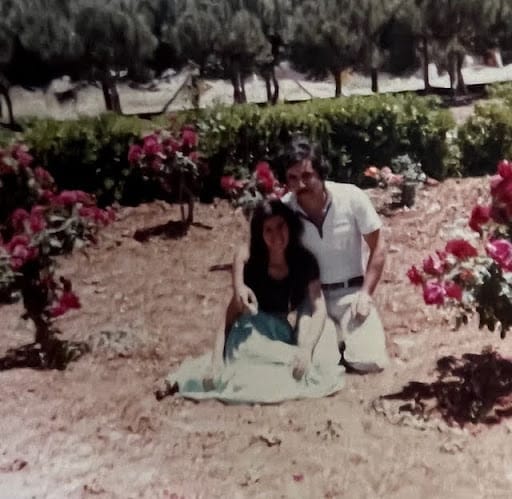
To my parents,
I am forever grateful for the risk you (and my uncles and many others) took to grant me, my brothers, my cousins, and the next generation a life of opportunity and safety. Our existence is a monument to your strength and a testament to your selflessness. You left everything and everyone you knew to give us the gift of freedom, dignity, and the privilege to shape our future. Recognizing this, I feel it's only fitting that I'm willing to risk everything in return—to speak up, fight for our cause with my own hands and heart, and ensure your sacrifices were not in vain.
Baba & Mama - I see your pain, I feel your pain, even without your words! I feel all of it every time I look at these pictures of you embracing under the orange tree that meant so much to my grandfather, I see nostalgia and sadness in your eyes no matter the occasion. I want to ask about everything you’ve been through but don’t want you to relive it, so I sit with scraps of stories from a life you shielded me from. When you show me the family smiling despite the loss that surrounded them, I feel inspired to choose hope over despair. You’ve given me the right to do so.
Your strength gives me courage - Love & Respect
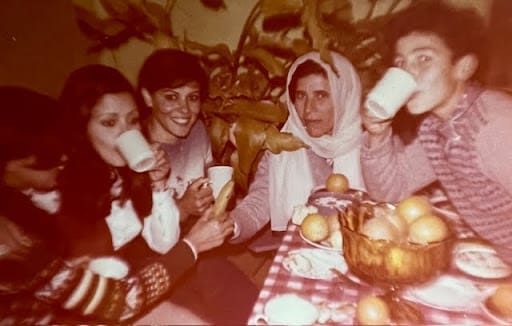
To us,
I'm sorry. I am so sorry that this pain is not new for us, that we have carried it for all of our lives, and that some of us (Palestinians) living in the diaspora might have distanced ourselves from the anguish of our homeland. In our effort to assimilate and build lives in new lands, there's a chance we've moved too far from the suffering of our people back home.
I know I have.
Sometimes, I find myself paralyzed by the apathy surrounding me in this country. There’s a weight to that apathy, a shame and sadness that we wake up with every day knowing we are forced to deny our roots and the struggles that have shaped us and our people. How can I choose sides? For me, home is where my husband and son are, but Palestine remains my home, too. I no longer accept that acknowledging one negates the other. I want both my loved ones and my homeland.
I am part of a system that acts against my core values and identity. This strikes my heart - a difficult but crucial realization. My tax dollars fund the killing of my people. How does one reconcile that? So, I am awakening, too. As vulnerable as we are - occupied land, forbidden name, people starved and killed - our strength is envied. The eyes and ears of the world finally see and hear the same things ours do.
Love & Respect. Let’s be strong together - We will show each other how.
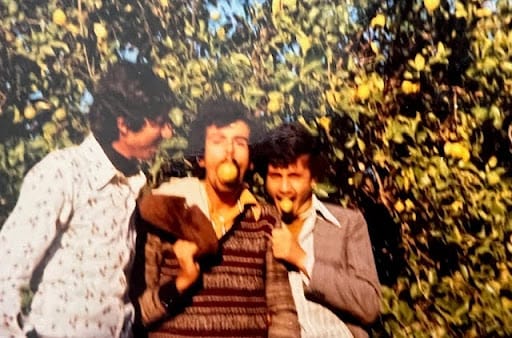
Where do we - you and me, awake and aware - go from here?
The last five months have brought clarity to my life like never before—all the noise, the endless hustle, and the to-do lists that seemed so important genuinely don't matter. They don't. What matters is you and me. People matter. Babies matter. Women matter. Men matter. Humans matter.
A Palestinian said this once:
“...most important, humanism is the only, and I would go so far as to say, the final resistance we have against the inhuman practices and injustices that disfigure human history.” ― Edward W. Said, Orientalism
Another said this:
“Wherever you are, whatever sand you can throw on the gears of genocide, do it now. If it's a handful, throw it. If it's a fingernail full, scrape it out and throw. Get in the way however you can. The elimination of the Palestinian people is not inevitable. We can refuse with our every breath and action. We must.” - Rasha Abdulhadi
Today, I say this: Let’s get to know each other, one human to another. This is my handful of sand. My name is Karmel, and I'm Palestinian.
I’m one of 7 million in the Palestinian diaspora. Like most of us, I live with a library of stories of horror and despair in my family history. My father is a humble man from a village named Kufur Thilth; my mother grew up in a city called Qalqilia. During the Six-Day war, Israel invaded Qalqilia and my mother's family sought refuge in the caves of a nearby mountain with the rest of the village. They stayed there for several days. When they returned, they were not allowed back into their homes. Instead, they were forced onto buses that drove them to Nablus (about 20 miles away) and were told to forget this land and never look back; Jordan was their new home. In Nablus, my grandfather, old and tired, refused to journey further. He insisted they must return to Qalqilia to water the freshly planted oranges. There was no bus to take them back, so they walked the 20 miles. There, they found their house was looted and burnt.
Just like that, everything was gone - except the Israelis. Suddenly, my family was under a brutal occupation just because they refused to leave the soil of their ancestors.
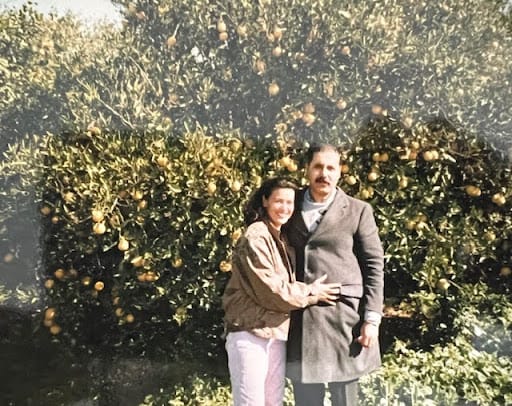
My dad worked on the farms. His passion, however, was learning. To him, knowledge was his ticket to a different life, filled with dignity and freedom of choice. He was also quite the romantic. When my parents met, they would write each other poems laced with beautiful lyrics from Abdel Halim songs (the Egyptian Elvis). Everyone around them knew how madly in love they were. Pure, innocent love- the one we all crave! But in 1975, at the age of 17 and without any formal charges or a trial, my dad was kidnapped in the middle of the night and imprisoned for two years. Why? Because the occupying Israeli forces suspected him of being part of a "resistance" group.
My father epitomizes peace. He embodies gentleness, strength, and endless kindness. Like his love for my mother, these facets of his character are undeniable to anyone who meets him. They were invisible to the occupiers, though. All they could see was a threat from a man who refused to hide his history and insisted on living his life entirely.
I won't go into the harrowing details of the torture he endured, but I will tell you that the soldiers quickly learned how unbreakable this man is. You get the gist of it in today’s reports of Israeli torture of Palestinian civilians in detention. My father’s story is like thousands of other Palestinian men and women who Israel has jailed without charge. Just in my family alone, I have 2 uncles who were kidnapped by the IDF at 15 and returned 6 months later with no explanation and a memory so dark it chases them to this day. When my father was released, he fled the occupation, crossing the border to Amman, Jordan to reunite with my mom and continue his studies.
My father and mother started from scratch in Amman. They had nothing but each other and, soon, three children. We were born in Al Nuzha, close to the refugee camps. Citizens of nowhere. Returning to Palestine was a dream for my dad, one deferred and denied because his Palestinian ID was revoked by the Israeli government. When my grandfather passed away, my father couldn't return to bid him farewell - he now needed a visa to go to Palestine, a tourist in his motherland. I will never forget the pain in his eyes that day.
My parents refused to be consumed by their sorrow though, and built a life after the displacement and suffering of their early years and their parents' history. In the 2000s, looking for better opportunities for my brothers and me, my parents left the comfortable life they had built in Amman for the United States. I was 16 and remember thinking how shiny America was! They switched careers. No longer teachers (although they still quoted poetry to each other), they worked day and night for us, running a convenience store with their limited English. There was no safety net or room for failure. America was not home for my parents. They never genuinely felt at home anywhere. For them, 'home' became wherever we were.
We made it. By working hard, staying on track, and prioritizing our safety, my parents answered the enormous question posed to us by America: "How do we make it here?" At first, we found some peace in that. But we built those lives on top of wrongs that were never righted, suffering that went unacknowledged by the world, justice denied. This life my parents worked so hard to build, this life with people that I love, is intimately wrapped up in their losses, and now, my participation in systems that make people just like my grandparents suffer.
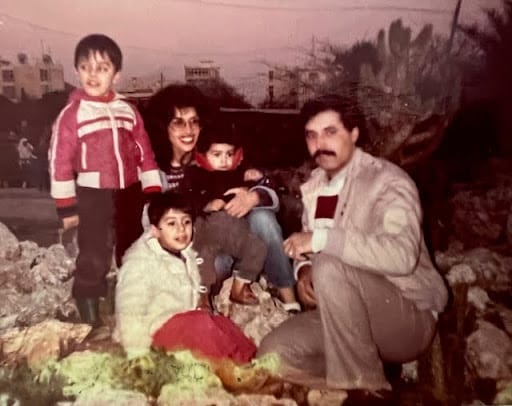
Sometimes, I am ashamed to be here. Some call it survivor’s guilt, but it’s deeper than that. The country that gave us so much also took so much - is taking so much - away from our people. How can I find peace when my leaders here seem to work endlessly on finding new ways to kill my people specifically? How do we, as Palestinians, find peace here when it's almost impossible for many to speak their mind and acknowledge their pain? Every fiber of my being wants to shout, “What’s happening is not ok, and it needs to stop.”
For decades, the narrative about my people in Palestine was shaped by selective historical accounts, limited footage, and restricted access to the reality of our suffering. Our identity has been perverted. We are only portrayed as villains and enemies of freedom, painted as boogeymen by the people who occupy our land and sometimes our very homes. We are denied the empathy that would be afforded to anyone else.
Things are changing now. The veil has been lifted, and the truth about the Palestinian struggle is becoming widely known and felt by the world. The movement mirrors my own life: I am grateful that it is happening - and deeply sad that it took such incredible violence and cruelty to make it happen.
I will never bake again without thinking of the people who paid for flour with their lives, their bodies piled up on the same truck that brought them food. The flour that “fortunate” Palestinians must use to stave off famine is stained red. The price of flour in Palestine is now death.
Who can forget Hind's six-year-old voice, heavy with despair? It haunts me, like the woman who lost her Idris and the fragments of my family’s stories. It reminds me of the urgency of our struggle, the voices silenced too soon, and the profound connection we share with every soul enduring this pain. Her voice and countless others fuel my resolve to stand up and act. To honor them with every atom of my existence. After all, we have the luxury to decide to look away. They cannot. I will not.
This is not an article or a diary. It will not catch you up on 75 years of terror. 75 years of suppression. 75 years of apartheid. It is a song, intended to be heard. I finally feel comfortable sharing what I have lived and how our world is built on the suffering of those we think are invisible. Politics are complicated, but this is not. I am done with helplessness. I hope you are too.
You know me now, my family, my history, my fears and my hopes, the complicated combination of experiences that comes with being a Palestinian, an American, and above all, a human. I want to know your story, how you came to this moment and how you have met it and how you have allowed it to change you. This is how we remember our humanity.
I am glad you’re here. And sad that it has taken so long. I am eager to begin the work of setting things right and working together as people who recognize one another’s humanity. I cannot wait to build this new world together, not on suffering and sorrow but on the promise of a free and liberated Palestine.
Thank you for reading. To share your thoughts, or your own story, you can reach out to media@techforpalestine.org. Love & Respect.
